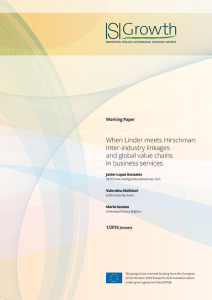The scholarship on Global Value Chains (GVCs) is recently focusing on the international fragmentation of production that involves services and in particular business services (BS). It has been argued that participation in business services GVCs might open up new opportunities for catching up in developing countries. What are the theoretical and empirical bases for such a claim? What are the determinants of a country participating in business services GVCs? This paper puts forward the conjecture that factor endowments and costs are not the only driver for the emergence of BS GVCs and that the specific domestic structure of backward linkages à la Hirschman is of high importance. We empirically test this conjecture on the basis of the World Input Output Data. We then attempt implications in terms of industrial policy for developing countries, particularly on the importance of developing domestic industries with backward linkages with business services before joining BS GVCs as a catching-up strategy. We suggest therefore some caution when considering unconditional participation in BS GVCs as a new development pathway, prior to securing opportunities for sectoral and technological upgrading linked to the presence of a core, backward-linked manufacturing base. Our findings are relevant also in the light of most recent developments of the debate around a “premature de-industrialisation” of developing countries (Rodrik 2015).
 When Linder meets Hirschman: Inter-industry linkages and global value chains in business services
When Linder meets Hirschman: Inter-industry linkages and global value chains in business services
Javier Lopez Gonzalez
OECD Trade and Agriculture Directorate, Paris
Valentina Meliciani
LUISS University, Rome
Maria Savona
University of Sussex, Brighton
